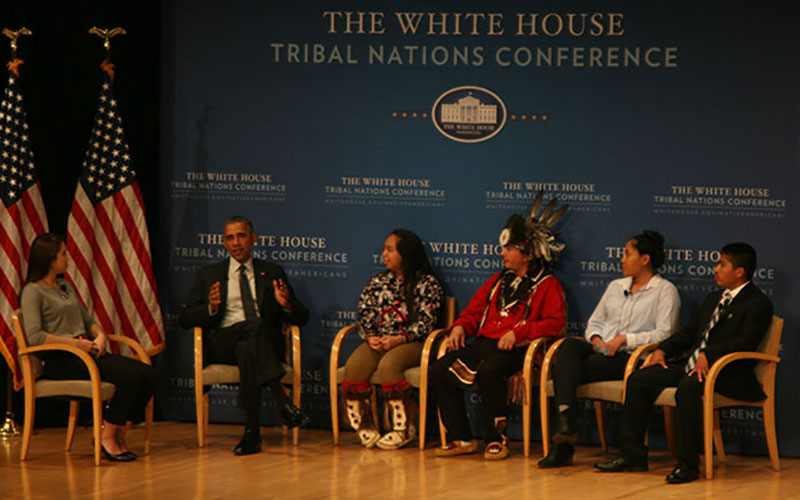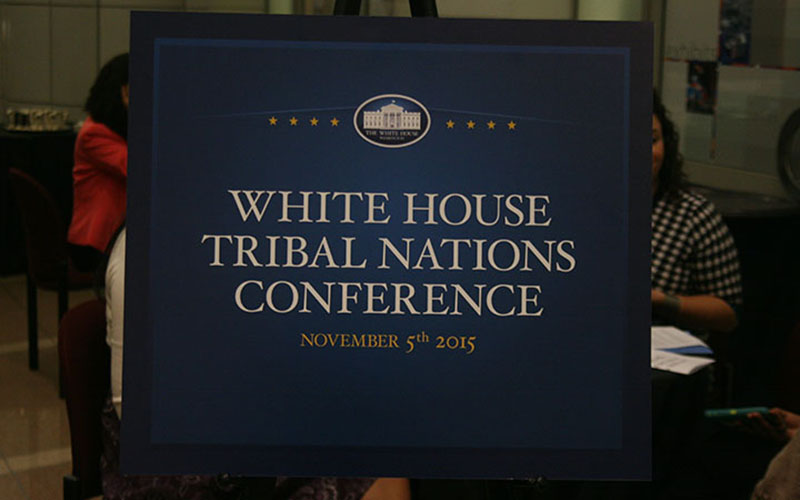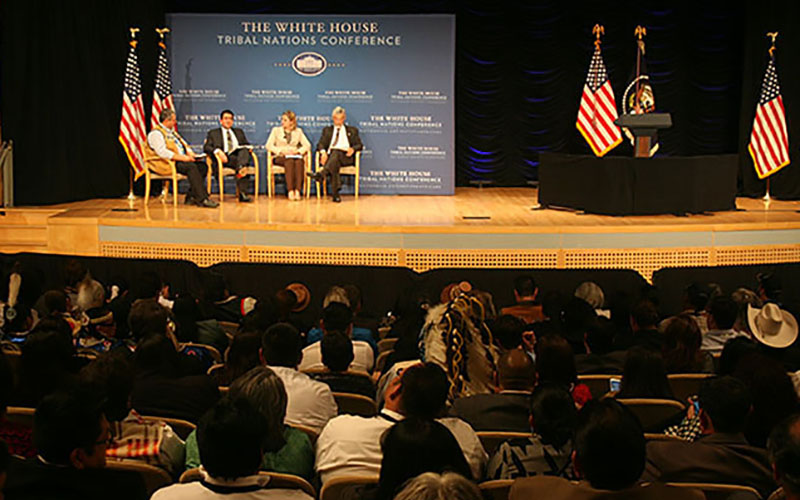
President Barack Obama speaks with a panel of tribal youth that included Blossom Johnson, in the white blouse, a Navajo woman who pressed the president on several issues facing Native youth. (Photo by Tom Blanton/Cronkite News)

Hundreds of tribal leaders gathered in Washington for the seventh White House Tribal Nations Conference, meeting with one another and with Cabinet-level officials who discussed administration policy. (Photo by Tom Blanton/Cronkite News)

Tribal officials, including at least one in full traditional feathered headdress, listen to a panel of White House officials, one of several over the day discussing policies affecting tribes at the seventh annual gathering. (Photo by Tom Blanton/Cronkite News)
WASHINGTON – Arizona college student Blossom Johnson painted a bleak picture Thursday for President Barack Obama of life on the Navajo reservation, describing poverty and a childhood clouded by friends lost to suicide.
“When I go home I don’t really have a suitable home, and I don’t have running water or electricity,” said Johnson, 23, a native of Black Mesa. “I want to know what kind of programs you have to offer Native American communities who have the worst housing and living conditions.”
Johnson’s comments came during an hour-long discussion between Obama and a handful of youth representing tribes from around the country, the marquee event of the seventh annual White House Tribal Nations Conference in Washington.
All 562 federally recognized tribes were invited to send representatives to the event, and hundreds did. They spent the day meeting and hearing from Cabinet-level officials who laid out a raft of administration initiatives, on everything from protecting sacred sites to helping bring high-speed Internet to tribal homes.
Obama arrived late in the afternoon to close out the event. He drew cheers from the friendly audience when he joined Johnson and three others – who represented the Yup’ik, Mohawk and Seminole tribes – on stage at the Ronald Reagan Building to discuss ways his administration could help Native youth.
“One of the reasons I’m invested in your success is that I’ve gotten to know many of you,” Obama said, after referencing his “adoption” by the Crow Nation during his first run for president in 2008.
The audience ranged from those in suits and dresses to some in traditional Native American attire, but they cheered in unison when Obama reaffirmed his commitment to bettering the economic and social outlook of Indian Country.
“When we talk about the future of Indian Country, we’re really talking about young people,” Obama said. “Many of the young people I’ve met have gone through more than anybody should have to experience in a lifetime.”
In response to Johnson’s question, the president said his administration has been working to boost resources available to tribes “on almost every measure,” from health care to schools to economic development.
“It’s a matter of getting help from Congress to build out the infrastructure that people need,” Obama said. “It’s not acceptable that anybody doesn’t have running water in this country.”
When the youth on stage were given time to ask questions, Johnson didn’t hesitate to open up to the president.
“I wanted to let you know that I lost four friends to suicide in middle school,” Johnson said, before asking the president how he plans to address the mental health of veterans and Native youths who are “ready to speak about it” because “no one really speaks for (them).”
Obama reassured Johnson and the crowd that “it’s not a weakness, it’s a strength for you to seek out help when you are suffering from severe depression.”
The conversation then turned to education, which Obama called “the key to a middle-class life” and crucial for Native youth “to learn who they are and where they come from.”
“The most important way that Indian Country is going to improve its economic prospects is through (education),” Obama said.
Johnson thanked Obama for creating the Obama Scholars Program at Arizona State University. Johnson is in the program, which covers tuition and expenses for students from poor households.
Obama also discussed the high obesity rate among young Natives, which he blamed on poverty and a lack of access to healthy foods.
“The success of our tribal communities is tied up with the success of America as a whole,” Obama said before leaving to a standing ovation. “If the next administration is smart, they’ll want to continue what we’ve done, because we’ve made progress.”